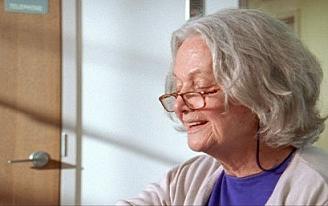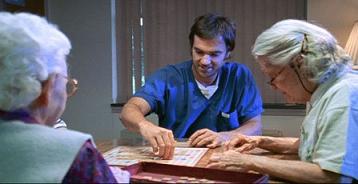Assisted Living


When Elliot Greenebaum's Assisted Living begins, it's difficult to tell whether it is a documentary or a piece of fiction. As the credits begin rolling, the camera interviews different employees of a retirement home. The epiphany comes when one realizes that the names on the bottom of the screen do not match the names of the actors in the film. Yet, Greenebaum proceeds merrily; his film a hybrid between the two. It was a smart choice, since it allows a more intimate, raw feel to the movie, complementing the story that eventually emerges, which is the relationship between Todd (Michael Bonsignore, Amnesia, A Cry for Help), the janitor, and Mrs. Pearlman (Maggie Riley), one of the elderly living in the facility.
It is quickly apparent that Todd was fired. As the film opens, he does not look like much a janitor. He smokes pot at work, is habitually late, and seems to taunt the patients. In the worst example, he calls some of the patients and pretends to be God. He has few redeeming qualities about him, and looks like a real jerk. His coworkers seem to have mixed emotions about him, but the patients seem to enjoy his company. Assisted Living tracks the last week of Todd's employment. It makes a few jumps back and forth in time, forcing viewers to wait for crucial elements in the narrative, but Todd's character quickly changes as the last week elapses. Everything begins slowly, showing the monotony of living in an assisted living facility. It's easy to see why Todd could get so bored.
Assisted Living (which won the Grand Jury Prize at 2003 Slamdance Festival) works as a movie that shows how one person can affect the life of another. Greenebaum initially presents Mrs. Pearlman as needy. She is suffering from Alzheimer's, and always seems to want Todd around. When he shows up, she ignores him, but when he tries to leave, she thinks up an excuse to make him stay. Todd's frequent tardiness exacerbates this, since he can be hard to locate. At one point, Mrs. Pearlman wants to speak with her son in Australia. She claims the phone in her room is broken, but she's made this claim many times. At this point, viewers are not sure if she even has a son in Australia. To calm her down, Todd speaks with her on the phone, pretending to be her son. Their subsequent conversation is the most powerful aspect of Assisted Living. Riley's performance is heartbreaking and strong, and it profoundly affects the way that Todd looks at things.
The change in Todd's perspective happens quickly, and because of the way that Greenebaum handled the scene, is totally believable. But what really makes Assisted Living work is the performance by Riley. She comes off initially as needy and almost petty in her attempts to grab Todd's attention. However, after the aforementioned scene, it becomes clear why she is acting this way. It is an extremely strong, moving scene that literally comes out of nowhere. It is this sudden shift that also affects Bonsignore, who does nicely with his part. It's a small movie given that there is little else, but packs a surprising wallop in the emotional department.